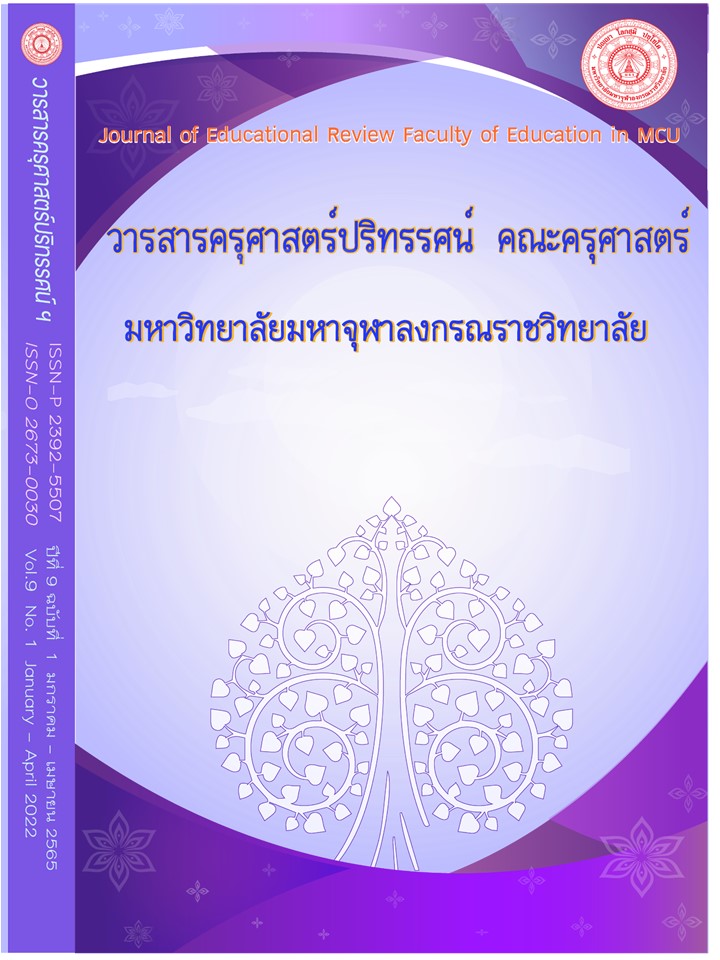THE DEVELOPMENT OF PRESERVE CULTURAL HERITAGE VOLUNTEER NETWORK OF THE FLOATING-MARKET COMMUNITY IN RATCHABURI PROVINCE
Main Article Content
Abstract
The purposes of this research article were 1) to analyze the state of participation in preserve cultural heritage of the floating-market community in Ratchaburi province, 2) to synthesize the guidelines of creating the heritage immunity and public interest of the floating market communities in Ratchaburi province, 3) to create a volunteer network for conservation the cultural heritage of floating market community in Ratchaburi province through the participation process of social institutions. This research was an operational research with the important data obtained from in-depth interviews and specific group discussions from 23 people by a specific random method according to the characteristics of representation of an appropriate sample group. The data were analyzed by trying to maintain the original phrases in order to serve as a base for analysis and design the activity model that appropriate and consistent with current conditions, and put it to the field test with 30 volunteers. Analyzing the performance process by each indicator together with reference statistics to find the fact from the practice of the form of action research. The findings of this research were following: 1) The state of participation in preserve cultural heritage of the floating-market community in Ratchaburi province found that based on planning aspect, it was found that cultural heritage of the community was used as a tool to generate income from tourism etc., 2) the guidelines for creating a volunteer network for conservation the cultural heritage of floating market community through the participation process of social institutions that appropriate and consistent with current conditions that was characterized by a network of "Pavara" , and 3) the network of volunteer conservation of culture way of the Damnoen Saduak floating-market community which had an action campaign for cultural heritage conservation and cultural heritage by emphasizing on the dissemination of 22 issues of laws that should be known for the people of the Damnoen Saduak floating-market community.
Article Details

This work is licensed under a Creative Commons Attribution-NonCommercial-NoDerivatives 4.0 International License.
ทัศนะและความคิดเห็นที่ปรากฏในบทความในวารสารฉบับนี้ถือเป็นความรับผิดชอบของผู้เขียนบทความนั้นเพียงผู้เดียว และไม่ถือเป็นทัศนะและความรับผิดชอบของกองบรรณาธิการ
กองบรรณาธิการขอสงวนสิทธิ์ในการคัดเลือกบทความลงตีพิมพ์และจะแจ้งให้เจ้าของบทความทราบหลังจากผู้ประเมินบทความตรวจอ่านบทความแล้ว
ต้นฉบับที่ได้รับการตีพิมพ์ในวารสารครุศาสตร์ปริทรรศน์ คณะครุศาสตร์ มหาวิทยาลัยมหาจุฬาลงกรณราชวิทยาลัย ถือเป็นกรรมสิทธิ์ของคณะครุศาสตร์ มหาวิทยาลัยมหาจุฬาลงกรณราชวิทยาลัย ห้ามนำข้อความทั้งหมดหรือบางส่วนไปพิมพ์ซ้ำ เว้นเสียแต่ว่าจะได้รับอนุญาตจากมหาวิทยาลัยฯ เป็นลายลักษณ์อักษร
References
เกรียงศักดิ์ เจริญวงศักดิ์. (2543). การจัดการเครือข่าย: กลยุทธ์สำคัญสู่ความสำเร็จของการปฏิรูปการศึกษา. กรุงเทพมหานคร: ซัคเซสมีเดีย.
สำนักงานคณะกรรมการกฤษฎีกา. (2559). เจตนารมณ์พระราชบัญญัติส่งเสริมและรักษามรดกภูมิปัญญาทางวัฒนธรรม พ.ศ. 2559. กรุงเทพมหานคร: ฝ่ายผลิตเอกสาร สำนักงานคณะกรรมการกฤษฎีกา.
การท่องเที่ยวแห่งประเทศไทย. (2545). สถานการณ์การท่องเที่ยว. กรุงเทพมหานคร: การท่องเที่ยวแห่งประเทศไทย.
จีรศักดิ์ ปันลำ. (2560). รูปแบบและกระบวนการสร้างเครือข่ายมัคนายกในการส่งเสริมการเรียนรู้พระพุทธศาสนาในล้านนา. ดุษฎีนิพนธ์พุทธศาสตรดุษฎีบัณฑิต. มหาวิทยาลัยมหาจุฬาลงกรณราชวิทยาลัย.
ทรงเดช ทิพย์ทอง, มานิตย์ โกวฤทธิ์ และศตวรรษ หน่อแก้ว. (2562). การพัฒนาเครือข่ายแหล่งท่องเที่ยววิถีศิลป์บนเส้นทางบ้านศิลปินล้านนา. รายงานการวิจัย. มหาวิทยาลัยมหาจุฬาลงกรณราชวิทยาลัย.
นฤมล นิราทร. (2543). การสร้างเครือข่ายการทำงาน: ข้อควรพิจารณาบางประการ. กรุงเทพมหานคร: มหาวิทยาลัยธรรมศาสตร์.
พรชัย พิญญพงษ์. (2560). รูปแบบการสร้างเครือข่ายขององค์กรพุทธโลก. ดุษฎีนิพนธ์พุทธศาสตรดุษฎีบัณฑิต. มหาวิทยาลัยมหาจุฬาลงกรณราชวิทยาลัย.
พระครูบวรสิริทัต (สมพงษ์ สิริวณฺโณ). (2560). การท่องเที่ยวชุมชน: การวิเคราะห์กระบวนการสร้างเครือข่ายและผลสัมฤทธิ์ในจังหวัดจันทบุรี. ดุษฎีนิพนธ์พุทธศาสตรดุษฎีบัณฑิต. มหาวิทยาลัยมหาจุฬาลงกรณราชวิทยาลัย.
พระครูสิริสุตานุยุต (สมาน จนฺทรํสี). (2556). การมีส่วนร่วมในการกำหนดนโยบายสาธารณะด้านการศึกษาพระพุทธศาสนาและศิลปวัฒนธรรมของเครือข่ายชาวพุทธ จังหวัดลำพูน. รายงานการวิจัย. มหาวิทยาลัยมหาจุฬาลงกรณราชวิทยาลัย.
พระใบฎีกาสัญญา อภิวณฺโณ. (2558). กระบวนการมีส่วนร่วมในการสร้างเครือข่ายการพัฒนาความเป็นเมืองของชุมชนในตำบลไร่ขิง อำเภอสามพราน จังหวัดนครปฐม. วิทยานิพนธ์พุทธศาสตรมหาบัณฑิต. มหาวิทยาลัยมหาจุฬาลงกรณราชวิทยาลัย.
ราชบัณฑิตยสถาน. (2556). พจนานุกรมฉบับราชบัณฑิตยสถาน พ.ศ. 2554. พิมพ์ครั้งที่ 2. กรุงเทพมหานคร: ศิริวัฒนาอินเตอร์พริ้นท์.
วีระศักดิ์ เครือเทพ. (2560). เครือข่าย: นวัตกรรมการทำงานขององค์กรปกครองท้องถิ่น. กรุงเทพมหานคร: สำนักงานกองทุนสนับสนุนการวิจัย.
สำนักงานคณะกรรมการพัฒนาขีดความสามารถในการแข่งขันของประเทศ และสำนักงานคณะกรรมการพัฒนาการเศรษฐกิจและสังคมแห่งชาติ. (2548). เครือข่ายวิสาหกิจ (คลัสเตอร์) เพื่อยกระดับความสามารถในการแข่งขัน. กรุงเทพมหานคร: สำนักงานคณะกรรมการพัฒนาการเศรษฐกิจและสังคมแห่งชาติ.
สิทธิชัย เครือวุฒิกุล. (2562). รูปแบบการพัฒนาระบบเครือข่ายและความรับผิดชอบต่อสังคมของอุตสาหกรรมผลิตแก้วไทย. ดุษฎีนิพนธ์พุทธศาสตรดุษฎีบัณฑิต. มหาวิทยาลัยมหาจุฬาลงกรณราชวิทยาลัย.
สุพิมล ศรศักดา, สิทธิมนต์ ติสันเทียะ และเรืองเดช เขจรศาสตร์. (2559). ยุทธศาสตร์การพัฒนาเครือข่ายทางการศึกษาของโรงเรียนพระปริยัติธรรมแผนกสามัญในจังหวัดอุบลราชธานี. รายงานการวิจัย. มหาวิทยาลัยมหาจุฬาลงกรณราชวิทยาลัย.


